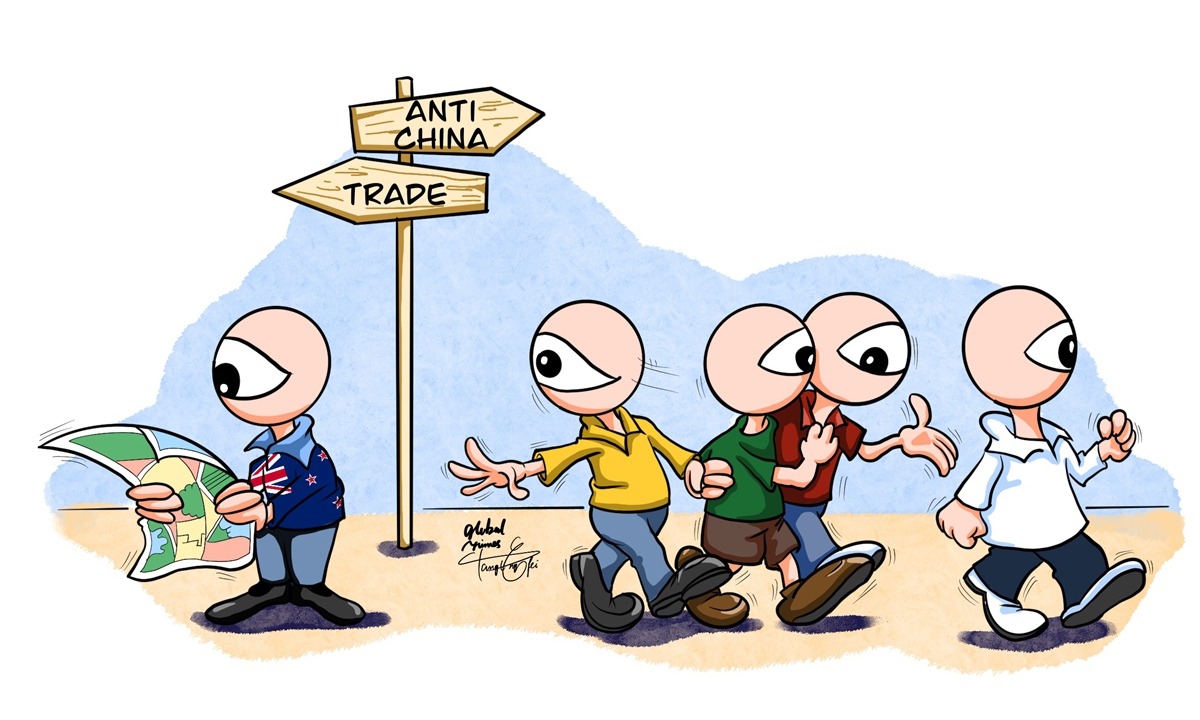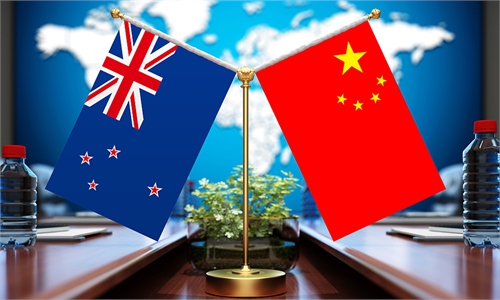
Illustration: Tang Tengfei/GT
New Zealand Prime Minister Chris Hipkins kicked off a visit to China with a 29-member delegation. He is set to meet Chinese leaders and attend the Summer Davos Forum in Tianjin. In December, 2022, China and New Zealand celebrated their 50th anniversary of diplomatic relations, and Hipkins' visit to China will be an important opportunity for both countries to enhance the quality of their bilateral relationship and tap into their cooperation potential.The meeting between leaders will once again demonstrate the stability of China-New Zealand bilateral ties. Despite the changing international situation, China and New Zealand have continuously promoted the institutionalized construction of their bilateral relationship, laying a solid foundation of political mutual trust. Against the backdrop of increasingly fierce great power competition and escalating geopolitical risks, the stable development of China-New Zealand relations has important and exemplary significance in the international community.
Hipkins, before kicking off his trip to Beijing for the first time, said, "the form of government that China has is a matter for the Chinese people," when asked whether the Chinese people had a say in the form their government took. He has diverged from Western hype about the Chinese leader. He showed a basic quality that a political leader should have - knowing how to respect other countries.
New Zealand's independent foreign policy is an important guarantee for the stable development of China-New Zealand relations. As the US has identified China as its top competitor, some Western countries have followed suit in formulating their foreign policies, ultimately harming their own national interests. New Zealand has relatively done well in putting the interests of its own people first when formulating its policies toward China, adhering to the diplomatic principles of seeking common ground while reserving differences and mutual respect, and rejecting external interference from Western countries such as the US. New Zealand's independent foreign policy has not only won it autonomy and influence in the international community but also provided broad development space for its education, tourism, and agriculture industries through the stable development of China-New Zealand relations.
Over the past two decades, educational and tourism contacts between the two countries have been strengthening. Before the outbreak of COVID-19, China had become New Zealand's largest source of foreign students, with more than 80 direct flights between New Zealand and China each week during peak season, and China was New Zealand's second-largest source of tourists. Hipkins explicitly stated before his visit to China that China is "a critical part" of New Zealand's economic recovery. It can be foreseen that Hipkins' visit to China will further consolidate the existing advantages of bilateral economic and trade cooperation and expand new areas of cooperation. Looking at the development process of the bilateral relationship between the two countries, China-New Zealand relations illustrate what mutual benefit and win-win cooperation mean.
Proactive cooperation is a prominent feature of the development of China-New Zealand relations. New Zealand was the first developed country to support China's accession to the World Trade Organization through bilateral negotiations. It was also the first to recognize China as a market economy, the first developed country to begin and conclude negotiations on a Free Trade Agreement with China, the first to upgrade its bilateral free trade agreement with China, and the first Western country to join the negotiations to set up the Asian Infrastructure Investment Bank.
In 2014, two years before the Paris Agreement came into effect, China and New Zealand signed Arrangement on Climate Change Cooperation demonstrating their forward-looking cooperation in global climate governance. Also in 2014, China and New Zealand innovated methods of development cooperation in the South Pacific region. Through a tripartite project with the Cook Islands in the South Pacific Ocean, China and New Zealand provided better hydro infrastructure for local residents, benefiting the local community.
Hipkins' visit to China will provide direction for China and New Zealand to jointly tackle future challenges. The economic structures of China and New Zealand are highly complementary, and the upgraded version of the China-New Zealand Free Trade Agreement provides institutional guarantees for bilateral economic and trade cooperation. There is huge potential for cooperation between the two sides in areas such as goods trade, service trade, and digital trade.
New Zealand's proactive diplomacy toward China provides an important reference for other Western countries to develop relations with China. Only by developing relations with China based on their own national interests can mutual benefit and win-win results be achieved, whereas blindly following hegemony will only lead to conflict and confrontation. The meetings between the leaders of China and New Zealand will send an important signal to regional countries and even the world, that only by jointly addressing global threats, abandoning ideological prejudices, and rejecting Cold War thinking can we follow the right path of history.
The author is research fellow at the Center for Australia, New Zealand and South Pacific Studies, Chinese Academy of Social Sciences. opinion@globaltimes.com.cn

